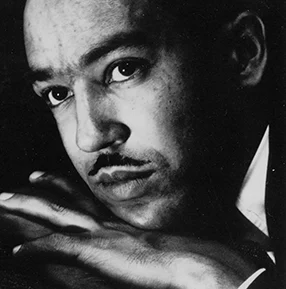Sport
Life
For him
Must be
The shivering of
A great drum
Beaten with swift sticks
Then at the closing hour
The lights go out
And there is no music at all
And death becomes
An empty cabaret
And eternity an unblown saxophone
And yesterday
A glass of gin
Drunk long
Ago
This poem is in the public domain. Published in Poem-a-Day on February 3, 2024, by the Academy of American Poets.
“Sport” appears in Langston Hughes’s collection Fine Clothes to the Jew (Knopf, 1927). In “Closing Time: Langston Hughes and the Queer Poetics of Harlem Nightlife,” published in Criticism, vol. 48, no. 3 (Summer 2006), Shane Vogel, professor of English and African American studies and chair of theater and performance studies at Yale University, writes, “Hughes’s poem ‘Sport’ [. . .] suggests how certain modes of existence are fully dependent on the musical and clock temporality of the afterhours club [. . .]. The ‘him’ in the second line refers to the figure named by the title: a ‘sport’ was a man of the fast set, one who lives the ‘sporting life’ among the gamblers, risk takers, and performers of the underworld, making occasional sorties across the borderland between sanctioned and criminal nightlife practices. The sport of the poet’s poem, however, [. . .] is not a type or a classification of person such as we might find in sociological studies or police reports, but a transient identity that becomes possible only within a certain spatial and temporal existence. The monosyllabic diction and repetition of ‘and’ in the second half of the poem gives the sense of a resistance to the inevitable end of the poem, a delay of poetic and actual closure as the image of the cabaret slips into the past and into memory. The vibrating sheepskin of the jazz band’s drum suggests a pulse and tension that, when silenced, juxtaposes against the unrealized potentiality of the unblown saxophone. The instruments of the jazz band mark the musical conditions and temporal limits by which the sport can, finally, exist at all.”

